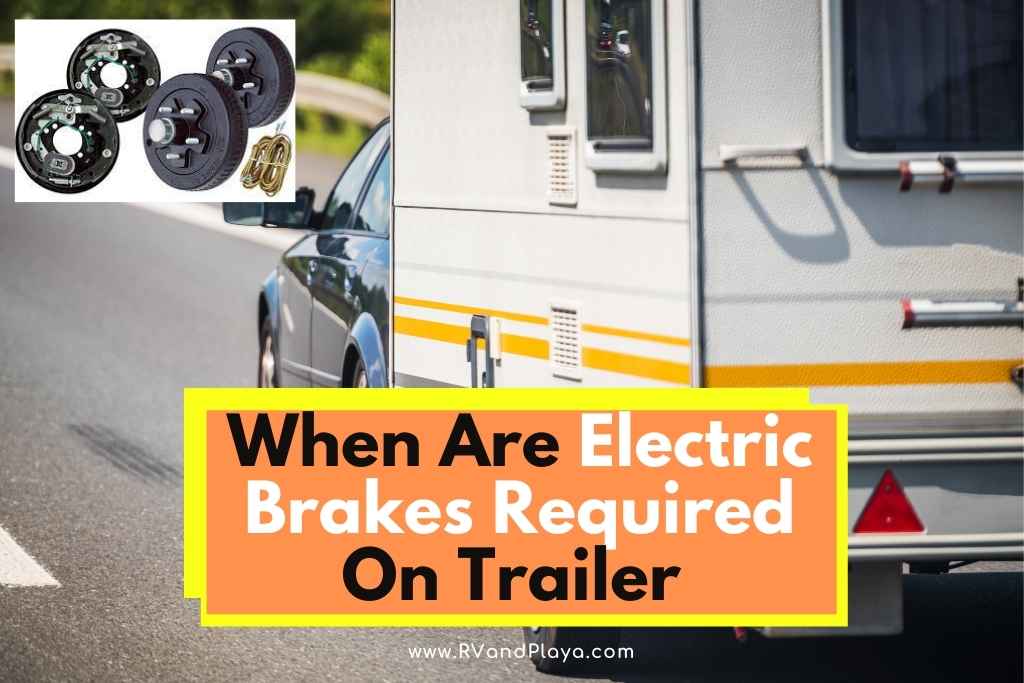When pulling any type of trailer it is very important to be able to stop both your towing vehicle and trailer in a safe manner.
Things happen on roads, animals can cross your way, other drivers could brake suddenly, and so on.
At any moment when you are towing a trailer, on the road you can get in a situation when you must start pumping the brakes.
But besides the general road safety, when it comes to the requirement of electrical brakes on a trailer you need to take into account the local legal regulations.
If you are in need of an answer to the question of when are electric brakes required on a trailer, you are at the right spot.
The short answer is that it depends on the state regulation through which you are driving the trailer, and it ranges from 1,000 pounds in North Carolina to 10,000 pounds in Massachusetts.
Table of Contents
What Are Electric Brakes For Trailers?
Before going into details about the requirements in each and every individual state, let’s get out of the way what are the electric brakes for trailers.
On your car, you usually have mechanical hydraulic brakes.
This means that by applying mechanical force on a controller you are activating a hydraulic system that controls the brakes.
In other words and oversimplified, when you step on the brake pedal the connected piston is pushing the brake fluid and then that pressure is pushing the pistons of brake calipers.
You apply to the brake pedal the mechanical force with your foot and it causes hydraulic pressure in brake lines, hence the name mechanical hydraulic brakes.
Electric brakes are almost always still the hydraulic type, but on many trailers, they have electromagnetically operated actuators instead of hydraulic pistons.
Read also: If My Trailer Has Electric Brakes Do I Need A Brake Controller?
And instead of by the mechanical force of your foot, the brakes are activated by an electric signal.
These types of brakes exist on some new cars and trucks but are much more common on trailers because it is much easier to make simple electric wiring for connecting them.
These brakes require a controller to be installed in the cab of the towing vehicle.
Per the method of brake activation, there are two types, time delay, and inertia-based.
Time delay controllers will activate the brakes as soon as you press the brake pedal, and then slowly start increasing the braking power per the settings of the controller.
The inertia-based controllers have an accelerometer sensor that measures the deceleration of towing vehicle when you engage the brakes, and then matches the braking force for the trailer brakes.
When Are Electric Brakes Required On Trailer?
As I’ve said in the introduction, it is required when the law of the road on which you are driving your trailer requires it.
While many vehicle regulations can be grandfathered, in other words, you are obliged to respect the laws of the state in which you live or in which your vehicle is registered, it doesn’t apply to trailer brakes.
All states mandate the use of either electric or air brakes on trailers that have a gross weight above a certain minimum limit.
In case that your trailer is below this limit, it doesn’t need to have brakes, but if it’s above it must have them to be road legal.
Broadly speaking, all states can be divided into eight groups by the minimum weight above which you must have brakes on a trailer:
- 1,000 pounds: New York and North Carolina
- 1,500 pounds: California, Indiana, and Nevada
- 2,000 pounds: Mississippi
- 3,000 pounds: Alabama, Arizona, Arkansas, Colorado, District of Columbia, Florida, Georgia, Hawaii, Idaho, Illinois, Indiana, Louisiana, Maine, Maryland, Minnesota, Montana, New Hampshire, New Jersey, New Mexico, Ohio, Oklahoma, Pennsylvania, South Carolina, South Dacota, Tennessee, Vermont, Virginia, Washington, West Virginia, and Wisconsin
- 4,000 pounds: Delaware
- 4,500 pounds: Texas
- 5,000 pounds: Alaska
- 10,000 pounds: Massachusetts
What Are Regulations In Missing States?
If you cared to count the above states, you would notice that DC is included, because it has local vehicle regulations, but also that nine states are missing.
This is because in those states requirements are worded differently than the simple lowest weight limit, so here they are in detail:
- Kansas: All combination vehicles must have brakes that will stop them within 40 feet from a speed of 20mph.
- Kentucky: All combination vehicles must have brakes that will stop them within 40 feet from a speed of 20mph.
- Michigan: Brakes not required on trailer with GVWR under 3,000 pounds if it is less than 40% of towing vehicle’s GVWR, but combinations must stop from 20mph within 30 feet if they have brakes on all wheels, or within 40 feet if they do not.
- Missouri: No requirement, except for the 5th wheel trailers which must have brakes
- Nebraska: Trailers with GVWR between 3,000 and 6,500 pounds must have brakes on at least two wheels, above 6,500 pounds must have brakes on all wheels.
- North Dakota: All trailers towed at speeds above 25mph must have brakes.
- Oregon: All combination vehicles must have brakes that will stop them within 35 feet from a speed of 20mph.
- Utah: All combination vehicles must have brakes that will stop them within 40 feet from a speed of 20mph.
- Wyoming: All combination vehicles must have brakes that will stop them within 40 feet from a speed of 20mph.
The above states that have regulations stating that a combination of vehicles must have brakes that will stop it within a certain distance from a certain speed can be confusing.
This requirement takes into account the existence of the brakes on the towing vehicle, so if your car or truck’s brakes can bring you to stop within these limits when towing some trailer without brakes, then they are not required.
Read also: Can I Tow A Trailer With Electric Brakes Without A Brake Controller?
But if your vehicle needs a higher stopping distance, then you need electric brakes on your trailer.
Some guesstimate you can use for these states, without actually measuring the stopping distance, is 3,000 pounds, above it is safer to have brakes.
Here are some of my favorite services, products, and Stores
Thank you for reading this article. I hope it helps you find the most recent and accurate RV, camping information. Here are some services, products, and Stores that I use and hope you´ll also find helpful.
There are affiliate links, so if you do decide to use any of them, I´ll earn a small commission. But in all honesty, these are the exact what I use and recommend to everyone, even my own family.
To see all my of most up-to-date recommendations, check out this resource that I made for you!
References
https://www.curtmfg.com/trailer-brakes-controllers
https://www.rvia.org/system/files/media/file/Trailer%20Brake%20Requirements.pdf
Recent Posts
Have you ever wondered should your electric trailer brakes lock up? Look no more. We´ve got you covered. If you have electric brakes on your vehicle, then you may find that they lock up on...
Curt Wireless Brake Controller: 9 Facts You Should Know (Explained)
The Curt Wireless Brake Controller bills itself as a completely wireless, non-invasive brake controller for trailers. So, what is this brake controller all about? Who could benefit from it? Well,...


